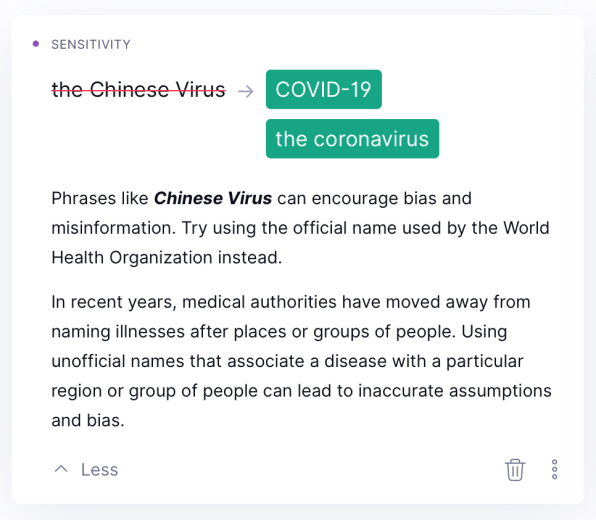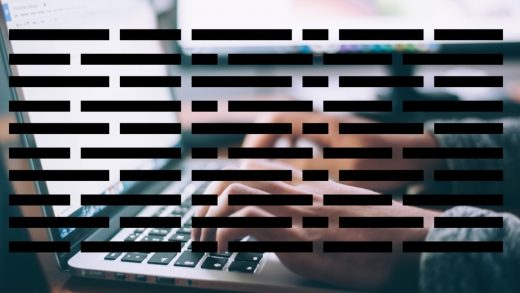If you write ‘Wuhan virus,’ Grammarly will remind you not to be racist
Grammarly, which offers a service designed to improve written communications, has launched a new sensitivity feature that’s very much of the moment. It detects when users write the politically loaded terms “Chinese Virus” or “Wuhan Virus,” or other variants, and suggests that they use “COVID-19” or “the coronavirus” instead.

Grammarly’s browser, email, and Microsoft Office plugins use AI to detect and correct basic communications matters such as spelling and grammar, but also more subtle things—for instance, tone, bias, inclusion, and sensitivity. The idea is that in important documents such as presentations or résumés, or in social media posts, the user can avoid inadvertently offending people or giving the wrong impression.
Grammarly points out that the World Health Organization issued guidelines in 2015 discouraging the use of geographic locations when naming illnesses, because it could stigmatize the people living there.
But the substitution of “COVID-19” for “Chinese Virus” is a little messy. COVID-19, which derives from “coronavirus disease 2019,” is the disease caused by the virus, not the virus itself. The name of the virus is SARS-CoV-2 or “severe acute respiratory syndrome coronavirus 2.” As the WHO’s page on the subject explains, “COVID-19 is the infectious disease caused by the most recently discovered coronavirus.”
So substituting “COVID-19” for “China Virus,” while a good idea in spirit, may inadvertently convey to the writer’s audience that he or she doesn’t know the difference between a virus and a disease. In some circles that might raise questions about the credibility of the writer.
“Our suggestion balances common usage with official recommendations,” a Grammarly representative said after we raised the issue. “We’ve found that many people are using these terms interchangeably, and it’s not always possible for Grammarly to detect whether someone is intending to reference the virus or the disease.” So it’s up to the user to pick the right suggestion.
War of words
The terms “China Virus” and “Wuhan Virus” are at the center of a geopolitical squabble between China and the United States, with each country using semantics to assign blame for the virus to the other. For many weeks, President Donald Trump insisted on using the term “China Virus,” and Secretary of State Mike Pompeo insisted on calling the coronavirus the “Wuhan Virus.” A joint statement by the G7 on the pandemic was reportedly derailed by the United States’ insistence on the inclusion of the “Wuhan Virus” term in the language.
Trump has defended his usage of the “China Virus” by simply saying “that’s where it comes from.” But the racial overtones of the terms, whether intended or not, have angered the Asian community in the U.S., which has reported increased incidences of racial slurs related to the virus directed at Asian Americans.
In late March, a bipartisan bill was introduced in the House of Representatives to formally blame China for the virus. But the Democratic sponsor of the bill, Representative Seth Moulton (a Democrat from Massachusetts), soon withdrew his support, saying the bill is being “used to create division, as the president’s xenophobia stokes racism across the country.”
Lupus Link? @DrOz reveals he has yet to find a Lupus patient using Hydroxychloroquine who has tested positive for the Wuhan virus. #AmericaFirst #KAG2020 #Dobbs pic.twitter.com/TDZVno2C0E
— Lou Dobbs (@LouDobbs) April 6, 2020
Many on the right—from Fox Business’s Lou Dobbs to Senators Ted Cruz and Tom Cotton to Larry the Cable Guy—still insist on using those terms to describe the virus.
Trump’s tone toward China—and his way of referring to the virus—changed after he talked to Chinese president Xi Jinping in a late March call. Xi appealed to stop saying “China Virus.” Trump’s acquiescence may be due at least in part to the fact that the U.S. is depending on Chinese suppliers to deliver desperately needed personal protective equipment to American hospitals, now being deluged by COVID-19 patients.
With the virus still advancing in the U.S., this language war’s cooling-off period may not last. But at least Grammarly users won’t unintentionally add to the heat.
Fast Company , Read Full Story
(21)



